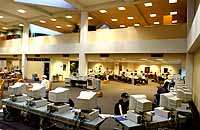| Wednesday, January 30, 2002 | ||||

|
|
Information
commons opens in library Students are
reacting positively to the newly opened Information Commons in the
Mary Couts Burnett Library, said Kim Weber, manager of User Services.
|
||
| CUE ignites faculty, department criticism | ||||
|
Time
requested to reach CUE faculty consensus Requests for
more time to hammer out a consensus over controversial elements
of the proposed Common Undergraduate Experience will likely be made
in today’s Faculty Assembly, professors said. |
Faculty
members meet today to debate core Debate over
the controversial Common Undergraduate Experience will move from
the Internet into an open forum when faculty meet today to discuss
the proposed core curriculum. |
|||
| What is the Common Undergraduate Experience (or CUE)? | ||||
| Technology | ||||
|
Instant
Communication One hundred
years ago people communicated through mail, telegraph or newspaper.
Keeping in touch with friends or relatives hundreds of miles away
was a difficult and slow process. The thought of talking directly
to someone half-way around the world was inconceivable. |
||||
|
|
||||


